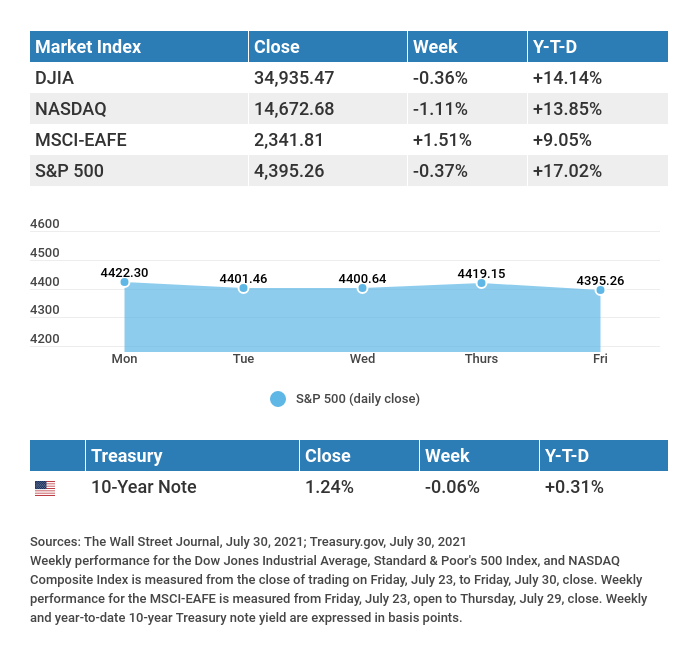The stock market posted small losses last week despite a very strong showing by corporate America.
The Dow Jones Industrial Average slipped 0.36%, while the Standard & Poor’s 500 lost 0.37%. The Nasdaq Composite index dropped 1.11% for the week. The MSCI EAFE index, which tracks developed overseas stock markets, jumped 1.51%.1,2,3


Stocks Take a Breather
There were plenty of excuses for stocks to retreat last week. News of a new phase in Chinese regulators’ crackdown on large, private-sector companies, a decline in new home sales, and concerns about the Delta variant weighed on investors.
After opening the week adding to record highs, stocks turned lower despite an earnings season that continued to impress.
Solid earnings from the mega-cap technology companies were not enough to propel stocks higher. Instead, stocks slipped throughout the week, fighting uncertainty over Chinese stocks, a disappointing second quarter Gross Domestic Product number, and a retreat in technology shares they reset to fresh company guidance.
Chinese Crackdown
Chinese technology stocks were under pressure last week as Chinese regulators continued their push to rein in large companies for reasons that include data security, abusive corporate behavior, financial stability, and curtailing private-sector power.
Chinese government actions raised new levels of concerns about which industries may next fall in the crosshairs of regulators. American investors have plenty of exposure to Chinese companies. Substantial losses were felt by mutual funds and hedge funds, which account for about 86% of the holdings in the over 200 U.S.-listed Chinese companies whose aggregate market capitalization exceeds $2 trillion.4
This Week: Key Economic Data
Monday: ISM (Institute for Supply Management) Manufacturing Index.
Tuesday: Factory Orders.
Wednesday: ADP (Automated Data Processing) Employment Report. ISM (Institute for Supply Management) Services Index.
Thursday: Jobless Claims.
Friday: Employment Situation Report.
Source: Econoday, July 30, 2021
The Econoday economic calendar lists upcoming U.S. economic data releases (including key economic indicators), Federal Reserve policy meetings, and speaking engagements of Federal Reserve officials. The content is developed from sources believed to be providing accurate information. The forecasts or forward-looking statements are based on assumptions and may not materialize. The forecasts also are subject to revision.
This Week: Companies Reporting Earnings
Monday: Simon Property Group, Inc. (SPG).
Tuesday: Alibaba Group Holdings (BABA), Activision Blizzard, Inc.
(ATVI), Amgen, Inc. (AMGN), Eli Lilly & Company (LLY), Diageo, PLC (DEO).
Wednesday: Roku, Inc. (ROKU), Prudential Financial, Inc. (PRU), CVS Health Corporation (CVS), General Motors, Inc. (GM), Etsy, Inc. (ETSY), Electronic Arts, Inc. (EA), MGM Resorts International (MGM), Match Group, Inc. (MTCH), Emerson Electric Co. (EMR), Booking Holdings (BKNG).
Thursday: Square, Inc. (SQ), Illumina, Inc. (ILMN), Duke Energy
Corporation (DUK), Albemarle Corporation (ALB), Cigna Corporation (CI), Becton, Dickinson and Company (BDX), Regeneron Pharmaceuticals, Inc. (REGN).
Friday: Dominion Energy (D).
Source: Zacks, July 30, 2021
Companies mentioned are for informational purposes only. It should not be considered a solicitation for the purchase or sale of the securities. Investing involves risks, and investment decisions should be based on your own goals, time horizon, and tolerance for risk. The return and principal value of investments will fluctuate as market conditions change. When sold, investments may be worth more or less than their original cost. Companies may reschedule when they report earnings without notice.

“I want to believe that there is a mountain so high that I will spend my entire life striving to reach the top of it.” – Cicely Tyson

How to Apply for Tax-Exempt Status for Organizations
If an organization wants to apply for tax-exempt status under Section 501(c)(3), they start by filling out a Form 1023-series application. They must submit a complete application, as well as the user fee. To complete the application, organizations also need their employer identification number. Generally, an organization that is required to apply for recognition of exemption must notify the IRS within 27 months from the date it was formed.
Some organizations, including churches or public charities whose annual gross receipts are normally less than $5,000, may not need to apply for 501(c)(3) status to be tax-exempt. When the IRS determines an organization qualifies for exemption under Section 501(c)(3), it will also be classified as a foundation, unless the organization meets the requirements to be treated as a public charity.
* This information is not intended to be a substitute for specific individualized tax advice. We suggest that you discuss your specific tax issues with a qualified tax professional.
Tip adapted from IRS.gov5

Brain Health Supplements: Are They Worth the Hype?
Over-the-counter brain health supplements claim to improve memory and promise enhanced memory and sharper attention and focus. Unfortunately, the FDA doesn’t oversee product testing or ingredient accuracy but instead looks for supplements that make health claims related to treating specific diseases. Because of this, a brain health supplement could claim that it helps with mental alertness or memory loss.
Most brain health supplements contain omega-3 fatty acids such as those found in fish oil. Rather than choose a supplement, some health professionals recommend eating a healthy diet full of healthy fats and vitamins and minerals instead. Also, exercising your brain like any other muscle may help with memory. Learning something new every day is a great way to keep your brain moving.
Tip adapted from Harvard Medical School6

A coin lies inside an otherwise empty bottle that has a cork inserted in its neck. How can you remove this coin without removing the cork or breaking the bottle?
Last week’s riddle: When can you add two to eleven and get one as the correct answer? Answer: When you add two hours to eleven o’clock, you get one o’clock.


Rafters traveling down the Colorado River, Grand Canyon National Park, Arizona.
Footnotes and Sources
1. The Wall Street Journal, July 30, 2021
2. The Wall Street Journal, July 30, 2021
3. The Wall Street Journal, July 30, 2021
4. Yahoo Finance, January 7, 2021
5. IRS.gov, January 8, 2021
6. Health.harvard.edu, September 2019
Investing involves risks, and investment decisions should be based on your own goals, time horizon, and tolerance for risk. The return and principal value of investments will fluctuate as market conditions change. When sold, investments may be worth more or less than their original cost.
The forecasts or forward-looking statements are based on assumptions, may not materialize, and are subject to revision without notice.
The market indexes discussed are unmanaged, and generally, considered representative of their respective markets. Index performance is not indicative of the past performance of a particular investment. Indexes do not incur management fees, costs, and expenses. Individuals cannot directly invest in unmanaged indexes. Past performance does not guarantee future results.
The Dow Jones Industrial Average is an unmanaged index that is generally considered representative of large-capitalization companies on the U.S. stock market. Nasdaq Composite is an index of the common stocks and similar securities listed on the NASDAQ stock market and is considered a broad indicator of the performance of technology and growth companies. The MSCI EAFE Index was created by Morgan Stanley Capital International (MSCI) and serves as a benchmark of the performance of major international equity markets, as represented by 21 major MSCI indexes from Europe, Australia, and Southeast Asia. The S&P 500 Composite Index is an unmanaged group of securities that are considered to be representative of the stock market in general.
U.S. Treasury Notes are guaranteed by the federal government as to the timely payment of principal and interest. However, if you sell a Treasury Note prior to maturity, it may be worth more or less than the original price paid. Fixed income investments are subject to various risks including changes in interest rates, credit quality, inflation risk, market valuations, prepayments, corporate events, tax ramifications and other factors.
International investments carry additional risks, which include differences in financial reporting standards, currency exchange rates, political risks unique to a specific country, foreign taxes and regulations, and the potential for illiquid markets. These factors may result in greater share price volatility.
Please consult your financial professional for additional information.
This content is developed from sources believed to be providing accurate information. The information in this material is not intended as tax or legal advice. Please consult legal or tax professionals for specific information regarding your individual situation. This material was developed and produced by FMG Suite to provide information on a topic that may be of interest. FMG is not affiliated with the named representative, financial professional, Registered Investment Advisor, Broker-Dealer, nor state- or SEC-registered investment advisory firm. The opinions expressed and material provided are for general information, and they should not be considered a solicitation for the purchase or sale of any security.
Copyright 2021 FMG Suite.